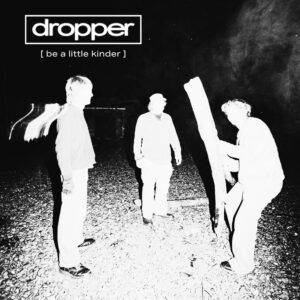Interview: Mike Garson – David Bowie’s Pianist Speaks to The 13th Floor: “It could have gone very sour!”
David Bowie is no longer with us, but many of the incredible musicians who played with him are.
A Bowie Celebration: The Alumni Tour comes to Auckland on May 4th. A band of musicians, most of whom played with Bowie, will take the stage at the ASB Theatre to pay tribute to the great man.
Leading the group and playing piano will be Mike Garson. Garson was integral to Bowie’s sound on his 1973 album, Aladdin Sane, and eventually played with Bowie on and off until he quit touring in 2003.
The 13th Floor’s Marty Duda spoke to Mike Garson about his creative life with David Bowie and about the other musical titan in the Spiders From Mars, guitarist Mick Ronson.
Click here to listen to the interview with Mike Garson:
Or, read a transcription of the interview here:
MD: It is a thrill talking to you, because I mean, I have to say, my favourite piano player and my favourite guitar player were both in the same band at the same time, so it was a thrill back for me in the day, back in the Spiders From Mars days – so, to be able to catch up with you now is pretty exciting.
MG: You were a big fan of Mick Ronson?
MD: He… is definitely my favourite guitar player by a country mile, yeah.
MG: Me too.
MD: What do you think is – about him, that makes him so special?
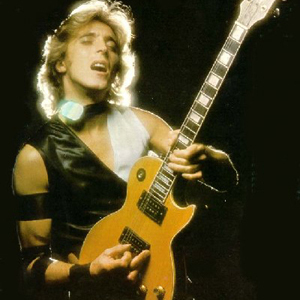 MG: Well, Mick was kind of magical, you know? He was the unsung hero, he was the secret sauce. We were very close. We’d have dinner every night – he’s the gentleman that auditioned me on the song Changes in RCA Studios in New York City, and he put the music in front of me, and I think I played for seven seconds, and he said, “You have the gig.” So we had this deep camaraderie in addition to the fact that I played on both of his solo albums. And toured with him. Unfortunately not the most successful tour, cause people just always connected him with “David’s sidekick”, but he did a great tour, and he was a great singer, and he made great albums. But he was magical in that – even when he wrote string parts for Life On Mars, and Starman, all those things were simple, but potent. So I would say that he had a magic intention as a musician and an artist, and he was that way as a person. So kind of, who you are in your music at a certain point, if you have evolved musically and spiritually, they’re probably the same.
MG: Well, Mick was kind of magical, you know? He was the unsung hero, he was the secret sauce. We were very close. We’d have dinner every night – he’s the gentleman that auditioned me on the song Changes in RCA Studios in New York City, and he put the music in front of me, and I think I played for seven seconds, and he said, “You have the gig.” So we had this deep camaraderie in addition to the fact that I played on both of his solo albums. And toured with him. Unfortunately not the most successful tour, cause people just always connected him with “David’s sidekick”, but he did a great tour, and he was a great singer, and he made great albums. But he was magical in that – even when he wrote string parts for Life On Mars, and Starman, all those things were simple, but potent. So I would say that he had a magic intention as a musician and an artist, and he was that way as a person. So kind of, who you are in your music at a certain point, if you have evolved musically and spiritually, they’re probably the same.
MD: Yeah. And it’s amazing that David Bowie put so much confidence in him, if he basically had him running the auditions, say for you – and giving him the ability to give the green light or whatever. You’d think that would be something that Bowie would want to have hands-on about, but he was able to… hand that off to…
MG: Well, David – David, was twenty, thirty feet back in the control room. So he was keeping his eyes – well, David probably looked at him.
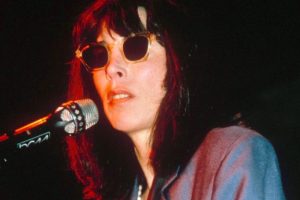 MD: So that’s basically how you got the gig. You were at that point playing with Annette Peacock, is that right?
MD: So that’s basically how you got the gig. You were at that point playing with Annette Peacock, is that right?
MG: I sure was. And I had played her album, and David liked her, you know. So… she’s the one who actually recommended me – cause when he came to America, he hung out with her, and was asking in fact for a recommendation for a pianist, and more so than that, he actually – before he met me, wanted her to play piano. But she had her own career, so, um, she turned him onto me, so it worked out really, really well.
MD: Yes, it did. And was one of the first sessions with Bowie the Lulu version of The Man Who Sold The World?
MG: That wasn’t – that was after Aladdin Sane, in fact.
MD: Oh, really? Okay.
MG: It was. But that was a great session, and I think Aynsley Dunbar played drums on that. And it was a wonderful session, and of course that song did better for her than David!
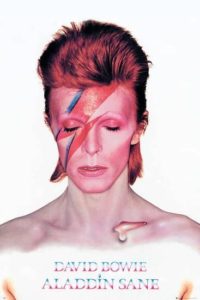 MD: So I’m kind of interested how the rest of the Spiders From Mars dealt with you, because you’re coming from this avant-garde jazz background, these guys were kinda rock ‘n’ roll guys, and here you come – working into the mix, so to speak, on Aladdin Sane. Was there any kind of tension there? Was there – how – what was the creative interaction like, between you and the rest of the Spiders?
MD: So I’m kind of interested how the rest of the Spiders From Mars dealt with you, because you’re coming from this avant-garde jazz background, these guys were kinda rock ‘n’ roll guys, and here you come – working into the mix, so to speak, on Aladdin Sane. Was there any kind of tension there? Was there – how – what was the creative interaction like, between you and the rest of the Spiders?
MG: It could have gone very sour, obviously, right? But – you know, Mick had a classical background, he was a very good pianist himself, so he had a… very large respect for me. And he sort of was the senior person of the Spiders, and I think he probably explained to the other guys, a lot of David’s music needed piano, so now David is a person who’s always expanding, and pushing the envelope… would want something new added to the cake, maybe some more whipped cream and sprinkles , so I became that, and we all became very good friends. I didn’t play on every song on the first tour. In fact, I was known to have gone out to the audience, and sneak out there when I wasn’t playing, and watched them perform, and it just… blew me away. Especially David’s gifts as a performer and singer. And of course, watching Mick play and do harmonies with him, and look good with him, play amazing with him.
So I got to see the show and also play, and on the initial tour, I only played maybe ten or twelve songs out of 22, on that very first tour, but a lot of people didn’t know that. But as the – I was only hired for eight weeks, and of course, that got turned around to a whole lifetime. But, bottom line was that, it expanded as the tours went on, and the records went on, so I played on almost everything eventually. But – sometimes the piano wasn’t necessary, especially like on Hang On To Yourself, or The Width Of A Circle, but Changes and Life On Mars, for sure needed piano.
MD: I know you’ve discussed your approach to playing on the track Aladdin Sane, but also on that album – you guys did a version of Let’s Spend The Night Together. You know, most piano players would approach that as kind of a, like a – from a Jerry Lee Lewis or Little Richard standpoint, but you kind of… went in a completely different direction. I was wondering if you could kind of touch on what was going on when you approached playing on that track.
MG: Interestingly enough, I gave a few piano lessons to Nicky Hopkins, who played with The Rolling Stones, and was kind of a, a piano player from that tradition. And – I just didn’t see that that was the right approach, because David could get that from anyone skilled in just rock playing, and he seemed to be encouraging me to just let loose!
And I think that’s what our magic was together, that we were both very free creatively and we were always looking for something new, so it was really a one-take…version, and it was quite humorous, and very effective, and… I do throw in some of those good ol’ blues licks, from time to time, but just the intro alone has to make one laugh. The fact that David would – I almost did a tongue-in-cheek, and the fact that he loved it, of course, is credit to David, because let’s face it – he is the ultimate casting director. Every musician he ever chose was perfect for the time and place that he hired them. And that’s a gift that… the only other person I know who has that, was Miles Davis in the jazz world.
MD: Alright. Hm. And then, kinda jumping forward a little bit, you played on Young Americans as well, is that correct?
MG: I sure did.
MD: And that – it seems to be, from a person who doesn’t play, to be a completely different type of approach to playing, you know, this rhythm ‘n’ blues, Philadelphia sound. Did you have to… change your headspace about playing on those sessions as opposed to what you were doing earlier with Bowie?
MG: You know, what people don’t know, is that in the first two years that I worked with him, from ’72 to ’74, he fired five bands. I was the only one he kept.
MD: Right.
MG: And it wasn’t particularly because we were friends, which we were, it was because my whole training in piano prior to meeting David encompassed classical, jazz, avant-garde, bebop, early stages of fusion, new-age… pop, gospel. So, being the sponge and chameleon David was, he just – on each album that I did in those few years… wanted another aspect of me, you know. The craziest one of course was Aladdin Sane, but then you get that romantic piano playing on Lady Grinning Soul, or you get that gospel playing on Can You Hear Me, or… It’s Gonna Be Me, or… Latin-ish. I set the whole precedence for the feel on Young Americans with that little piano intro. And Luther Vandross was in my band at that time, I was the musical director. So it was… a magical recording in Stigma Sound, in Philadelphia, back in that day.
MD: And then… you had like, almost a 30-year stretch before you recorded with Bowie again. Did you know you were going to come back to work with him again? What was going on there?
MG: It was only eighteen years.
MD: Eighteen years, okay.
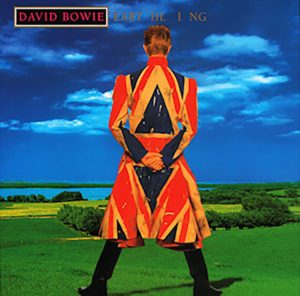 MG: But, but, but – you wouldn’t know it, because David gets on the phone, and says, “Hi Mike, it’s Dave.” And like, Dave who? You know what I mean? There was like, no time in his mind, and eighteen years had passed… and then I joined for Black Tie, White Noise, Buddha of Suburbia, Outside, Earthlings, you know, his Reality… there were some amazing records that were made then. It’s just that people tend to like, pick the top, most powerful period, which would have been the Ziggy Aladdin Sane years. But people will come to know, Outside and Earthling is quite substantial albums.
MG: But, but, but – you wouldn’t know it, because David gets on the phone, and says, “Hi Mike, it’s Dave.” And like, Dave who? You know what I mean? There was like, no time in his mind, and eighteen years had passed… and then I joined for Black Tie, White Noise, Buddha of Suburbia, Outside, Earthlings, you know, his Reality… there were some amazing records that were made then. It’s just that people tend to like, pick the top, most powerful period, which would have been the Ziggy Aladdin Sane years. But people will come to know, Outside and Earthling is quite substantial albums.
MD: Was he difficult to work with, later on in his career, than he was, back in his – in the 70s?
MG: Well, let’s say later on, he was more… level, and a family man. So we had all that in common. But the creative aspect of him… was always the same, to be honest with you.
MD: Alright. Now, the band that you’re bringing here to New Zealand, in a month or so, just if you can – for folks, just kind of run through just who else is coming along with you.
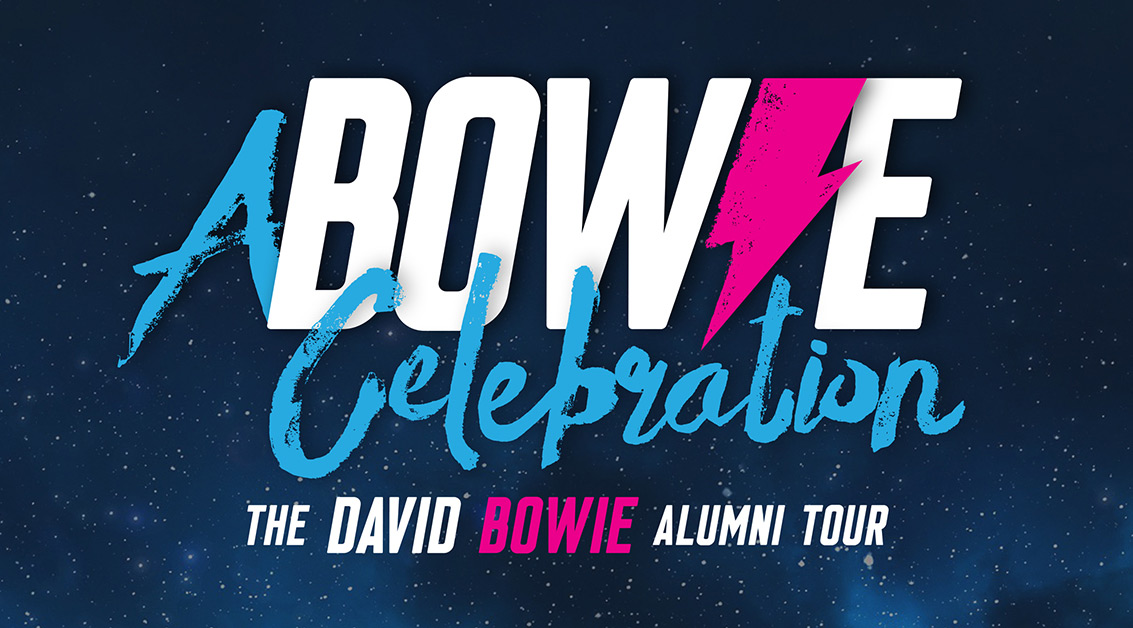
MG: It’s very interesting that I have… um, four singers! Normally I work with three, or two. Uh… I have Bernard Fowler, who wasn’t supposed to be with us, because he’s been a background singer for thirty years with The Rolling Stones, and he was supposed to be on tour with them, but Mick is having heart surgery, so they cancelled that tour, so he jumped on board. I have Corey Glover from Living Colour, he’s amazing. I have Gaby Moreno, who is a wonderful female vocalist from Guatemala, and wait ‘til you hear how she sings Five Years. And then I have Joe Sumner, who’s Sting’s son, who’s a powerhouse. And there’ll going to be a lot of duets, and great… it takes a village to do David’s music. You couldn’t have just one singer. So that’s my singers, then I have… Mark Plati, who produced a bunch of Bowie albums, and toured with us for many years in the late 90s and 2000s, he’s playing guitar. And then I have Gerry Leonard, who also was a music director, and produced a few of the Bowie albums, and he’s coming on guitar, so I have those two guitarists. I have Carmine Rojas, who’s playing bass, who played on Let’s Dance, China Girl, Modern Love, and toured with him on the Glass Spider Tour and Serious Moonlight Tour, and myself on piano, I have Lee John (Madeloni) on drums, who’s a great drummer, he’s actually Earl Slick’s son.
MD: Oh, really. Okay.
MG: Yeah! He’s our young member. And I think that’s the band…uh, so it’s kind of exciting, you know. It’s gonna be – I’ve worked with all these musicians over the last two, three years, I’ve already done about a hundred concerts with A Bowie Celebration and trying to… you know, bring the best of David’s music, and the deeper catalogues, to those who really loved him. And from the shows, we just finished… fifty shows. So the band is sounding quite good, a few of the personnel switch around – it’s always a switching thing, with alumni, because so many of them work with other artists currently, so I can’t get them all the time. Like Earl Slick’s on tour, with Glen Matlock in that period, and…
MD: Yeah, I think that Rufus Wainwright was just here, and I think Gerry Leonard was in his band, so.
MG: Exactly. But I was able to get Gerry to do this one. Mark Plati was just in Paris so he didn’t do the American tour, but I had Charlie Sexton with me in America, but he’s now back with Dylan – he wanted to come with us… so, you know, it’s always moving ahead on other shows… Stirling Campbell on drums, but he’s off with the B-52s – I had Gail Ann Dorsey, who was our bassist and singer with David for many years – she’s out with Lenny Kravitz. So I have access to ten or twenty living alumni who all wanna do it at different times, but in any given time, I always have three or four with me, and mind you, I’ve done many shows just solo piano, I’ve done shows piano and just vocals, I’ve done shows with a jazz trio, I’ve done Bowie shows with a symphony orchestra… so, I have a lot in my mind as the years proceed ahead of us, but I think this group is going to be quite good.
I put a very interesting set together, and it will vary through New Zealand and Australia because we have about thirty-five songs we could access. In any two-hour show you could only do about… you know, somewhere between nineteen and twenty-two songs. So, we’ll be shifting them around, you know.
MD: Yeah, it must be difficult to choose what songs to do, there’s such a huge legacy of music to draw from.
MG: Yeah, that’s my biggest problem – that’s my biggest problem. One of the things I actually wanna do sometime is go to some beautiful island for a week, bring a few thousand fans, and do three shows over six days, four hours each day, and cover over that, maybe 120 of my favourite songs.
MD: Nice. Yeah. That would be cool. Well, you know – New Zealand’s a beautiful island – two beautiful islands! So you could come down and do that here sometime.
MG: Uh. I would love to do that. You know, I was walking in New Zealand with David on the beach, back in 2000…can’t remember, ‘02 or ‘03 –
MD: 2003, yeah.
MG: Yeah, he actually said to me. “Mike, let’s just come to New Zealand and Australia for three months and nowhere else in the world.” I said, “I’m in.” And of course, it never came to be, because he never toured again, after that. That was the Reality Tour. But, I’ll never forget him saying that, and I will tell that to the audience… because he loved it there.
Click here for more info and tickets to see A Bowie Celebration at Auckland’s ASB Theatre, May 4th.
